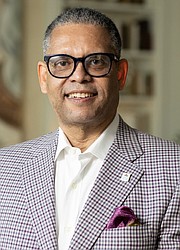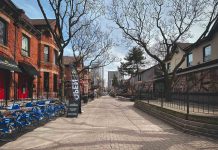The Government was yesterday urged to eliminate the 48 hour in-country COVID testing requirement for all tourists and make The Bahamas “more competitive” for the peak winter season.
Robert Sands, the Bahamas Hotel and Tourism Association’s (BHTA) president, told Tribune Business that the decline in Omicron-fuelled infections means this nation must give “serious consideration” as to which parts of its COVID-testing regime can be “safely eliminated” so that a “strong pace” in visitor bookings can be maintained throughout 2022.
Emphasising that he was not suggesting The Bahamas be “cavalier” when it came to visitor safety, he argued that it nevertheless must focus on removing all “impediments and obstacles” to travel to the greatest extent possible given tourism’s pivotal role in the country’s post-COVID economy.
The BHTA chief, in particular, focused on the removal of the requirement introduced on January 4 that all tourists – regardless of vaccination status – must take a COVID rapid antigen test if they remain The Bahamas for longer than 48 hours, asserting that the cost and “inconvenience” associated with this was at present no longer justified by the receding Omicron threat.
He added that its removal would also “make it a bit more difficult” for groups to either cancel or reduce their bookings “without penalty”, and “improve momentum” following the Christmas/New Year disruption caused by Omicron, converting it into “a robust rebound” for tourism in 2022.
“We have to seriously consider what are the impediments or obstacles to travel, and consider removing some that have been put in place,” Mr Sands told Tribune Business. “I would go out on a limb here and say that it’s maybe time to consider, or reconsider, whether the 48-hour testing on-island is still a viable option for the destination for a number of reasons.
“The COVID-19 numbers are coming down. There is the increased cost and inconvenience to the traveller, and third, competing destinations have this advantage over us if the same protocols are not in place in their respective jurisdictions. It makes us less competitive going forward.
“I say that recognising the safety of the destination, not only of tourists and the associates who serve them, must always be maintained. I’m not saying be cavalier in this approach, but serious consideration should be given to which parts of the testing regime can be safely eliminated at this particular time and make us more competitive.”
Mr Sands said the additional COVID testing costs involved in travelling to The Bahamas for a family of four, a husband, wife and two children, was a significant factor behind his call for a partial easing of this nation’s border entry measures and for it to fall “in line with what the rest of the world is doing”.
And, reiterating that himself and the BHTA were not suggesting that COVID-related health and safety be compromised, he also called for more consistency with testing and travel protocols as opposed to the constant tinkering that The Bahamas has engaged in.
“The multiple changes that have taken place in a very short period of time are very confusing to the travelling public, so we need to find a sweet spot that accomplishes all the results we want,” Mr Sands told Tribune Business.
“While it may have been necessary at the time they were introduced, the conditions that prevail now may suggest the easing of some of these protocols could be considered. I think that if we want to continue with a robust momentum in our tourism sector, these types of decisions will improve that and translate into a more robust rebound for the rest of the year.”
The Government’s decision to narrow the COVID testing window to three days before travel, and require all travellers to obtain the more expensive RT-PCR COVID test, was blamed for causing travel marketplace confusion immediately ahead of the vital Christmas/New Year season.
This was subsequently eased to a rapid antigen test for all vaccinated travellers, although the tighter three-day testing window has been maintained, but many felt the constant changes sparked uncertainty among potential visitors that compounded the deterrent effect caused by rising Omicron infections in The Bahamas and key tourist source markets.
However, COVID case numbers have dropped sharply from over 500 per day at the Omicron surge’s height to just 29 that were recorded on Monday. Hospital cases have also come down as the infection wave subsides, with just 65 persons requiring such care as of Sunday and only three in the intensive care unit (ICU).
Mr Sands yesterday backed the Government’s decision to maintain the pre-travel three-day COVID testing window on the basis that it was more likely to detect virus carriers than the previous five-day window. And the 24-hour pre-travel test for returning US citizens has to remain in place so they can meet their country’s entry protocols.
However, when it came to the costs and time required for a family of four tourists, the BHTA chief said they have to obtain an equal number of negative COVID tests within three days of travel plus pay for a $50 per head Bahamas Health Travel Visa – the latter bill alone coming to $200.
Then they have to pay for four more tests while in The Bahamas if here longer than 48 hours, “although the Government is considering that as part of the health visa arrangement”, and another four tests to return to the US.
These costs, Mr Sands said, were heaped on the price already paid for room accommodation, food and beverage and resort amenities, and threatened to fuel perceptions that The Bahamas is a costly, uncompetitive destination when measured against Caribbean and other rivals. Hence his plea for the 48-hour test to be eliminated to ease the burden amid the drop in COVID cases.
He added that such reforms would also aid The Bahamas’ group business, which is among the travel segments slowest to recover from the pandemic’s ravages. “This is a long lead time booking arrangement,” Mr Sands explained. “What a relaxation of the protocols may do is reduce the opportunity for a reduction in current room bookings.
“It will make it a bit more difficult to use the COVID-19 situation as an excuse to reduce bookings without penalty, and allow groups to book again with longer lead times. I believe that in places like the Family Islands, where it is perhaps not as easy to receive testing, some relaxation will assist with an increase in their bookings that represent a significant amount of rooms in their hotel sector.”
Disclosing that the Bahamian tourism industry has already witnessed “an uptick” in tourism demand as Omicron recedes, Mr Sands added: “I believe as protocols are removed you will see further increased demand. There’s no question that you will see an increase in demand once obstacles to travel are removed.
“We’re looking at travel demand for what is traditionally the busiest time of the season, February, March and April, so the opportunity for increased volumes is not that great because bookings are already in place. I think it is fair to say that the bookings are close to pre-COVID levels and, in some cases, exceed pre-COVID levels.
“But I can say that, for some of the bookings, the pace has dropped because of the protocols that were introduced. The removal of those protocols will help us to be strong in the booking pace for the remainder of the year. The tourism sector is pivotal to the Government’s recovery and economic recovery so it’s very important we have a very successful winter season.”
Mr Sands said incoming airlift into The Bahamas was “not quite there yet” in comparison to pre-COVID volumes but is “inching up on a monthly basis”. While Sandals Royal Bahamian’s re-opening will boost airlift demand, he added that this was counter-balanced in the short-term by the Melia’s closure and that of Atlantis’ Beach Towers as well as the British Colonial’s impending shut down.
Escape the ordinary and discover the extraordinary! From bustling cities to serene landscapes, every journey begins with a single step—let us guide yours. Enjoy curated itineraries, hidden gems, and hassle-free bookings designed for explorers at heart. Whether it's a weekend getaway or a globe-trotting adventure, your Next unforgettable experience is just a click away.










